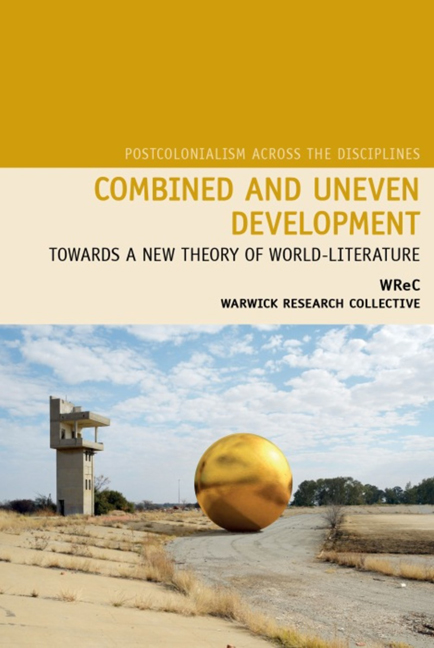Book contents
- Frontmatter
- Dedication
- Contents
- A Note on Collaborative Method
- 1 World-Literature in the Context of Combined and Uneven Development
- 2 The Question of Peripheral Realism
- 3 ‘Irrealism’ in Tayeb Salih's Season of Migration to the North
- 4 Oboroten Spectres: Lycanthropy, Neoliberalism and New Russia in Victor Pelevin
- 5 The European Literary Periphery
- 6 Ivan Vladislavic: Traversing the Uneven City
- Works Cited
- Index
2 - The Question of Peripheral Realism
- Frontmatter
- Dedication
- Contents
- A Note on Collaborative Method
- 1 World-Literature in the Context of Combined and Uneven Development
- 2 The Question of Peripheral Realism
- 3 ‘Irrealism’ in Tayeb Salih's Season of Migration to the North
- 4 Oboroten Spectres: Lycanthropy, Neoliberalism and New Russia in Victor Pelevin
- 5 The European Literary Periphery
- 6 Ivan Vladislavic: Traversing the Uneven City
- Works Cited
- Index
Summary
I
A single but radically uneven world-system; a singular modernity, combined and uneven; and a literature that variously registers this combined unevenness in both its form and its content to reveal itself as, properly speaking, world-literature – these propositions sum up the kernel of our argument. ‘World-literature’, as we understand it, is an analytical category, not one centred in aesthetic judgement. We find unconvincing those writings that seek to position the ‘world’ in ‘world literature’ in value terms, as signifying ‘world-class’ – as though ‘world literature’ were to be thought in analogy to those imaginary teams that sport enthusiasts love to argue about, in which the best players from everywhere and from all time are ‘selected’ to play together in some fantasy match or tournament: the Iliad, the Upanishads, Gilgamesh, the Divine Comedy, King Lear, Dream of the Red Chamber, Faust, Anna Karenina, One Hundred Years of Solitude and Things Fall Apart, for example. It is equally nugatory to think of ‘world literature’ as a kind of summit conference of great writers: exercises of this nature, as Bourdieu has pointed out, are both derealising (of time and place) and intellectualist. When we argue that it makes good sense to read, say, Wieland,Max Havelaar, Noli Me Tangere, Rickshaw and The Lost Steps together, we are not proposing any abstract connectivity linking them across time and space: our suggestion, rather, is that these texts should be considered together because they all bear testimony – in their own distinct ways, and in both their form and their content – to the ‘shock of the new’, the massive rupture effected at the levels of space-time continuum, lifeworld, experience and human sensorium by capitalist modernisation.
‘World-literature’ as we understand it is therefore a creature of modernity. Our definition differs obviously from that of Damrosch, who takes the category ‘to encompass all literary works that circulate beyond their culture of origin, either in translation or in their original language’ (2003: 4). Damrosch's formulation is self-consciously indifferent to historicity. Virgil's work circulates beyond its culture of origin; but so too do Petrarch's, Proust's and Murakami's. All four authors are therefore exemplars of ‘world literature’ for Damrosch. For us, by contrast, the ‘world’ identified in ‘world-literature’ is that of the modern world-system.
- Type
- Chapter
- Information
- Combined and Uneven DevelopmentTowards a New Theory of World-Literature, pp. 49 - 80Publisher: Liverpool University PressPrint publication year: 2015



